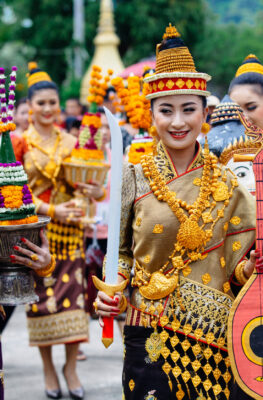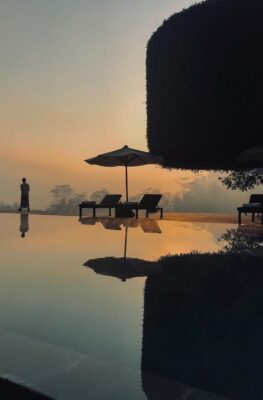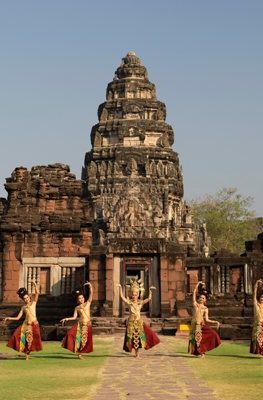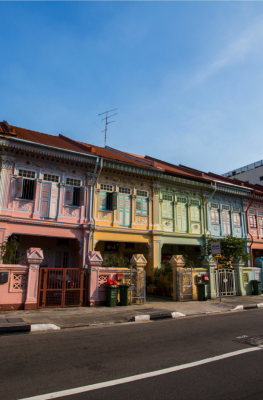Published on August 11, 2017

Hiking along the edge of the Batad Rice Terraces, Philippines. Image courtesy of Mike Aquino
Mike Huxley calls himself the “Bemused Backpacker”, but finds travelers’ health to be no laughing matter.
As a registered nurse, a former soldier and an avid traveler in Southeast Asia, Mike’s seen plenty of injuries and illnesses that might have been prevented with a little common sense. Mike does his best to correct this by running a popular travelers’ health clinic and sharing essential wellness tips on his blog and social media (Facebook | Twitter | Google Plus).
We caught up with him to get his thoughts on staying healthy while traveling in Southeast Asia.
Q: What, in your opinion, are the top 3 health threats for travelers, and how are we supposed to address them?
Mike: I think what is more common overall are the smaller everyday illnesses, especially problems related to the climate, heat and sun, and gastro problems like travellers diarrhoea. Most travellers will develop them at some point.
But in general terms I would say malaria and dengue are still the big two overall. Dengue especially at the moment.
The best ways to deal with malaria and dengue are good mosquito bite prevention techniques. Use DEET spray regularly and liberally, cover up, using a net if it is appropriate, and even wearing insect proof clothing is a good idea if you are prone to being bitten or are in a high risk area. Antimalarials are not always necessary but should be taken if they are recommended by a professional.
Prevention is always better than the cure.
Q: What wrong ideas/misconceptions do people usually have about traveling to SEAsia?
Mike: Half of the problem is travellers listening to unqualified advice from other travellers.
A big misconception is that people often think that the entire region of south east Asia is a malaria risk, it obviously isn’t (there are even variable risks within single countries), and there are a lot of other people who believe that it is not a problem at all.
The truth is obviously between these two extremes. Related to this is the fact that many people – based partly on these misconceptions – often refuse to take antimalarials based on fearmongering about side effects or take them when they are not necessary because of a misconception of the risk.
Another huge misconception I come across involves street food, a lot of people miss out on one of the best travel experiences in the region because they assume all street food is bad and will make them ill. This is such a shame!

Travel on top of a moving vehicle – unsafe? Image courtesy of Mike Aquino
Q: What are the worst mistakes travelers usually make when traveling to SEAsia?
Mike: There are a fair few, but I think the biggest mistakes people make usually involve not preparing enough beforehand.
Not getting vaccinated properly, refusing to take antimalarials (if they are advised), and not seeing a travel health specialist before they go. A very common mistake I see a lot (and is a big bugbear of mine) is travellers leaving seeing a travel nurse or doctor until a few days before they leave and not having enough time to get anything done.
All of these can increase your risk of becoming seriously ill and are easily sorted before arriving yet to most people they are simple afterthoughts.
Once they are actually travelling, however, it is predominantly small things people don’t do that can lead to them becoming ill simply through forgetting to look after themselves properly.
Not protecting themselves from the sun adequately can lead to heat exhaustion and sunburn, not keeping up with proper hand hygiene before eating can lead to various gastro problems, spending a lot of time near a toilet and even hepatitis A if they aren’t vaccinated, and I have to say it things like excessive drinking (those whisky buckets are a killer) and unsafe sex when they get back to those hostel dorms. All of these behaviours carry risks to your health.
Q: How has your background as a nurse prepared you for life as a traveler?
Mike: I was actually a backpacker long before I was a nurse. Nursing was my second career (I stopped travelling full time for a few years to go back to university and get my second degree in it, sticking to short snap years over the summer months in between studying).
Through my career I continued to travel but specialised predominantly in emergency nursing and travel medicine, both of which have given me handy skills to look after myself (and sometimes others) on the road. Over the years I have gained specific knowledge in tropical medicine, mountain first aid and other specialties as well that have all come in useful when I’ve been crashing through a jungle or hiking up a mountain somewhere.
* * * *
If you’re preparing for a trip throughout Southeast Asia, Mike recommends you follow a few simple rules of thumb to stay healthy all throughout.
Before you travel:
> Go and see a travel nurse or doctor at least 6 – 8 weeks before you travel.
> Make sure all your routine vaccinations are up to date and you get any further jabs that are recommended.
> Do your research and take any necessary preventative precautions if the areas you are travelling to have malaria, dengue or any other prevalent disease present.
> Prepare a good first aid kit.
When you are there:
> Research the locations of any pharmacies, clinics or hospitals in the areas you are travelling to just in case you need them.
> Give yourself time to acclimatise.
> Be sun aware, cover up, wear sunscreen and stay hydrated.
> Remember to apply any insect repellent and bite prevention method.
> Keep up with your hand hygiene before meals and after any ablutions.
> Don’t be afraid of the street food but use common sense about cleanliness and food prep, look






